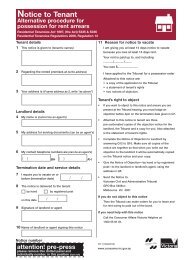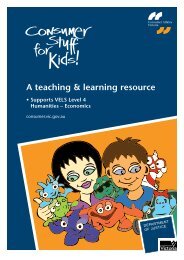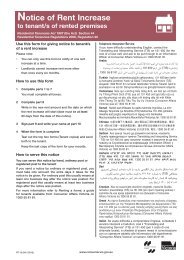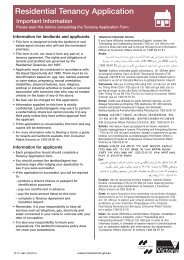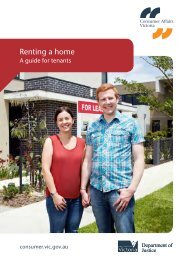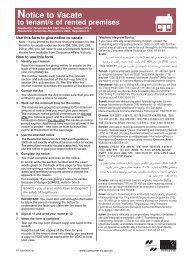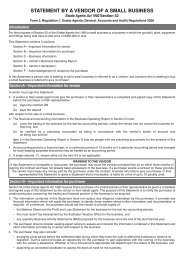Responsible gambling - Consumer Affairs Victoria
Responsible gambling - Consumer Affairs Victoria
Responsible gambling - Consumer Affairs Victoria
Create successful ePaper yourself
Turn your PDF publications into a flip-book with our unique Google optimized e-Paper software.
B3<br />
Gambling systems<br />
GAMBLER’S HELP LINE<br />
54<br />
<strong>Responsible</strong> Gambling | Section B: Gambling as a social activity<br />
<strong>Consumer</strong> <strong>Affairs</strong> <strong>Victoria</strong> | consumer.vic.gov.au<br />
Exercise 1 – A sure thing?<br />
The article belows examines sports <strong>gambling</strong> and the potential risks for consumers. Read the<br />
article and then answer the questions that follow.<br />
You can bet you’ll lose your money<br />
<strong>Consumer</strong>s are being fleeced by sports-<strong>gambling</strong> scams. If it sounds too good to be true, it probably is.<br />
By Peter Kell<br />
Hundreds of Australians are continuing to be fleeced by phone-based companies offering fast profits by<br />
getting different odds on the same sports event.<br />
It is called sports betting, sports trading or sports arbitrage, depending on the day, and about 40 operators<br />
have been identified, based mostly on the Gold Coast.<br />
A multi-agency taskforce set up this year has found that these scams have proliferated in recent years. Based<br />
purely on complaints received by the Australian Competition and <strong>Consumer</strong> Commission (ACCC) in the 12<br />
months up until the middle of this year, hundreds of thousands of dollars were conned from each of our states.<br />
Overall, up to $20 million may have been lost by Australian consumers in such schemes. How?<br />
Aggressive or persistent telemarketers, often using false names and phone lists bought from other<br />
companies, know how to hound consumers until a target pays up. They are trained to overcome objections.<br />
Their wages are linked to sales.<br />
Marketers offer potential customers plausible-sounding investment propositions, such as <strong>gambling</strong> on<br />
sporting events that have two different teams. It is promoted on the basis that bookmakers will either differ<br />
on which team will win or “make a mistake”.<br />
The spiel sometimes refers to taking advantage of different time zones.<br />
The operators claim they can spot these “opportunities” and take the best odds on offer by different bookies<br />
so that money is won (supposedly) regardless of the outcome. Schemes are littered with words such as<br />
“trading”, “investment” or “guaranteed returns”.<br />
Recently these operators have diversified into other areas such as sports tipping. Some also provide<br />
computer prediction software.<br />
Slick websites and brochures are used to verify claims by showing how much can be earned and providing a<br />
timeline for those earnings. Usually the timeline shows that earnings are realised in six months to a year.<br />
This time frame allows for the company to collect money from customers, fold and disappear. The<br />
companies tend to morph into new companies and use bogus addresses and contact details so that<br />
disgruntled customers cannot find them.<br />
The golden rule is to ask yourself:“Why, if you are being asked to ‘invest’, is the company selling the<br />
scheme instead of simply using it to make millions themselves?”<br />
They might tell you they use it themselves just to get you to hand over your money but ACCC officers found<br />
out they don’t.<br />
The reality is they make their money by taking yours, not by participating in the scheme themselves or<br />
sharing in the “profits”, which at any rate are unlikely to eventuate.<br />
Also, how much can you really afford to lose? Apart from the large up-front costs, at best these schemes<br />
show little or no return and in many cases your money simply disappears.<br />
Don’t be fooled by claims the company has a “refund policy” - this is more often than not an illusion.<br />
To avoid being on these phone lists, consumers should read the terms and conditions for any competition<br />
or survey that involves providing personal details. Usually there is a check box that offers the choice to not<br />
receive marketing information.<br />
PeterKell is the deputy chairman of the Australian Competition and <strong>Consumer</strong> Commission.<br />
Source: The Age, 2 September, 2009<br />
1800 858 858 www.problem<strong>gambling</strong>.vic.gov.au



